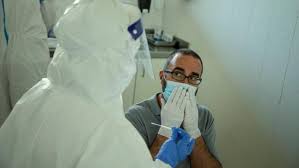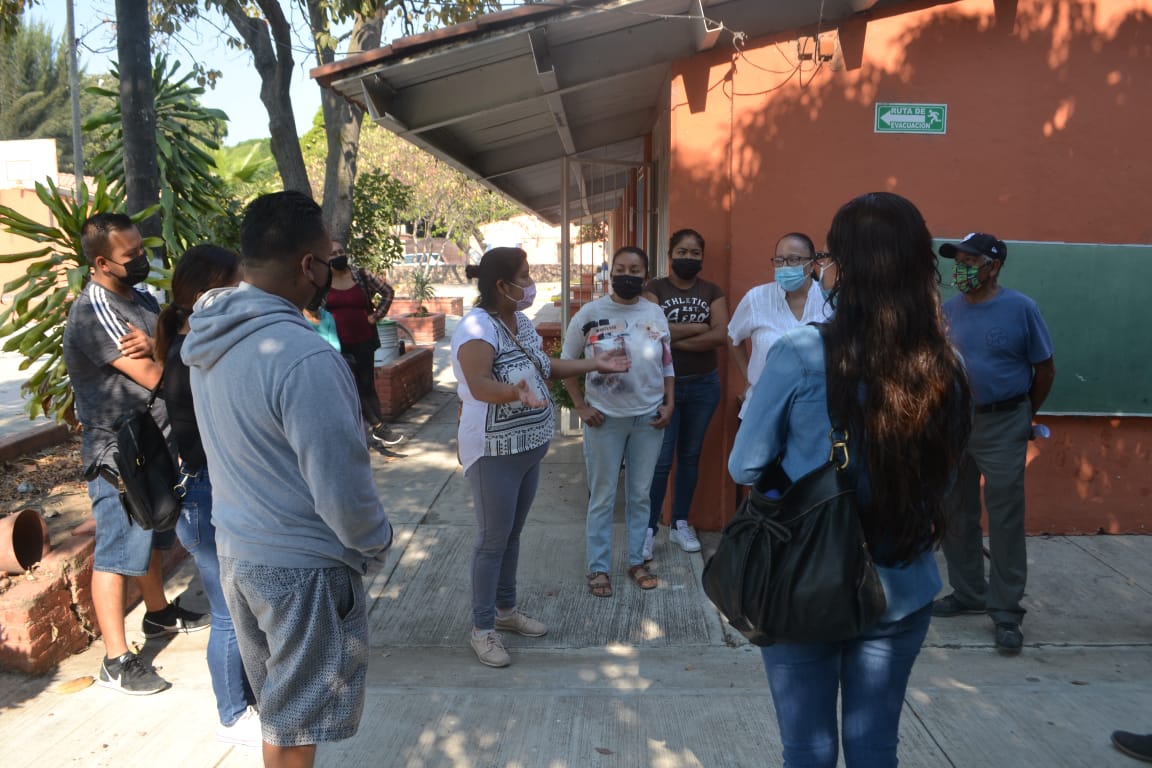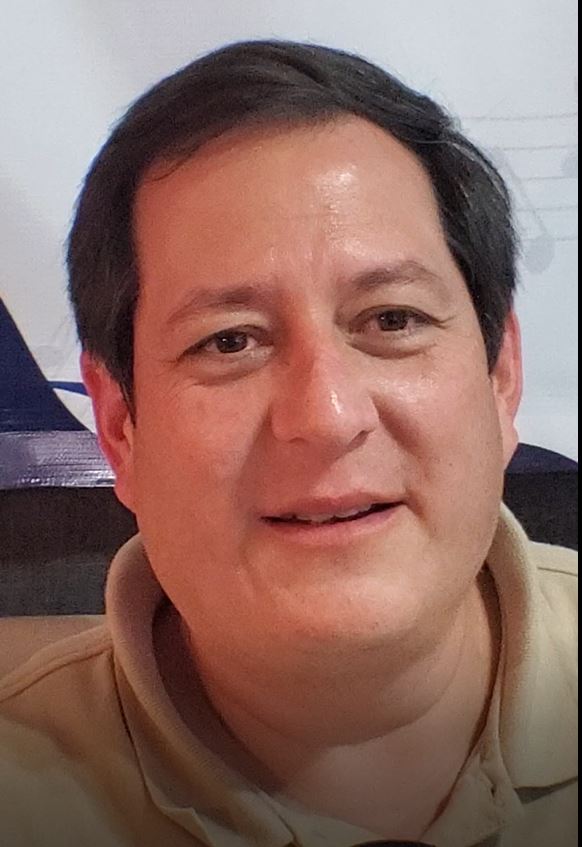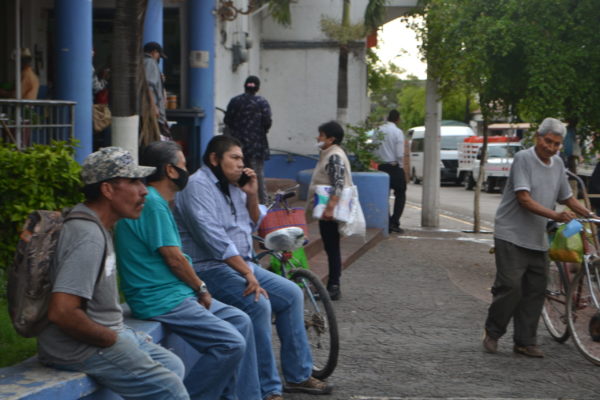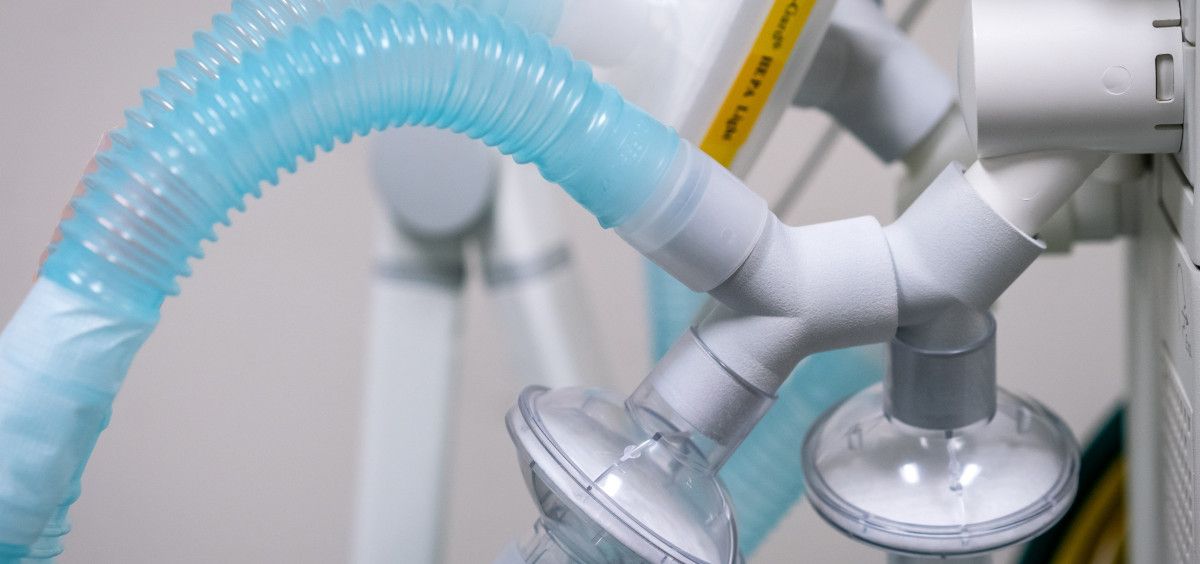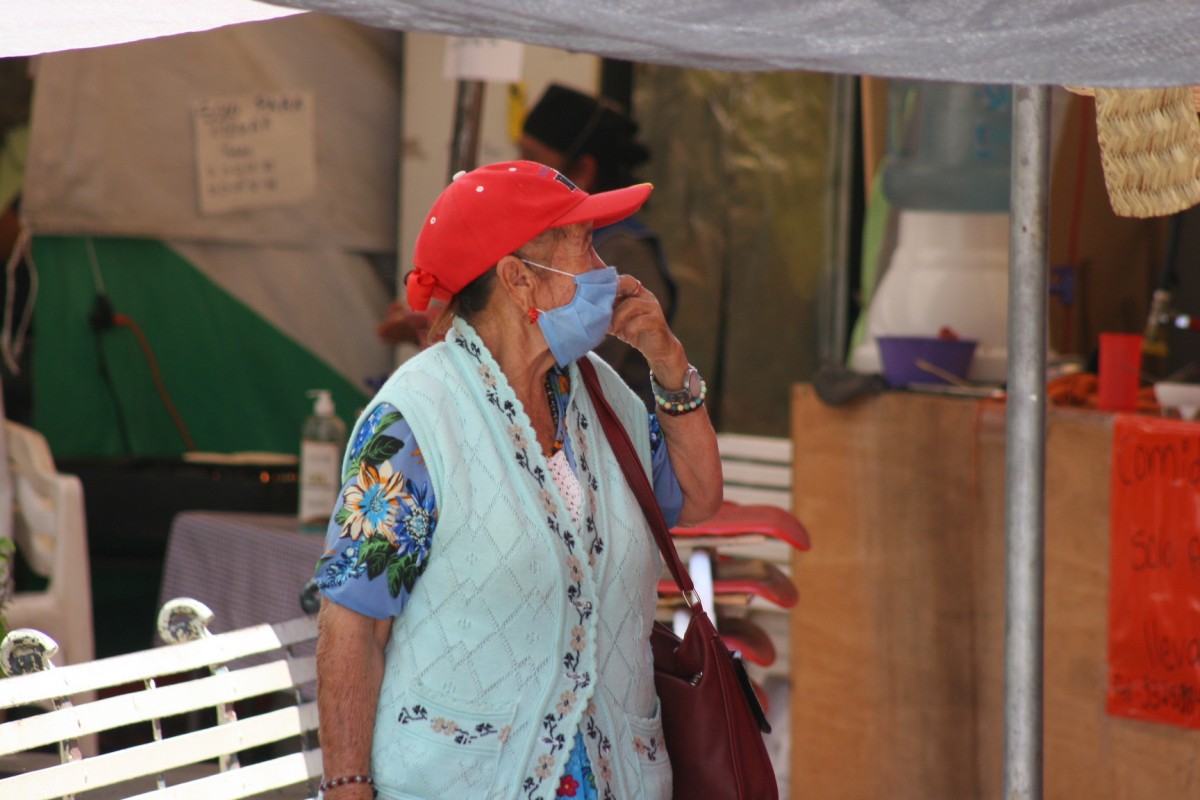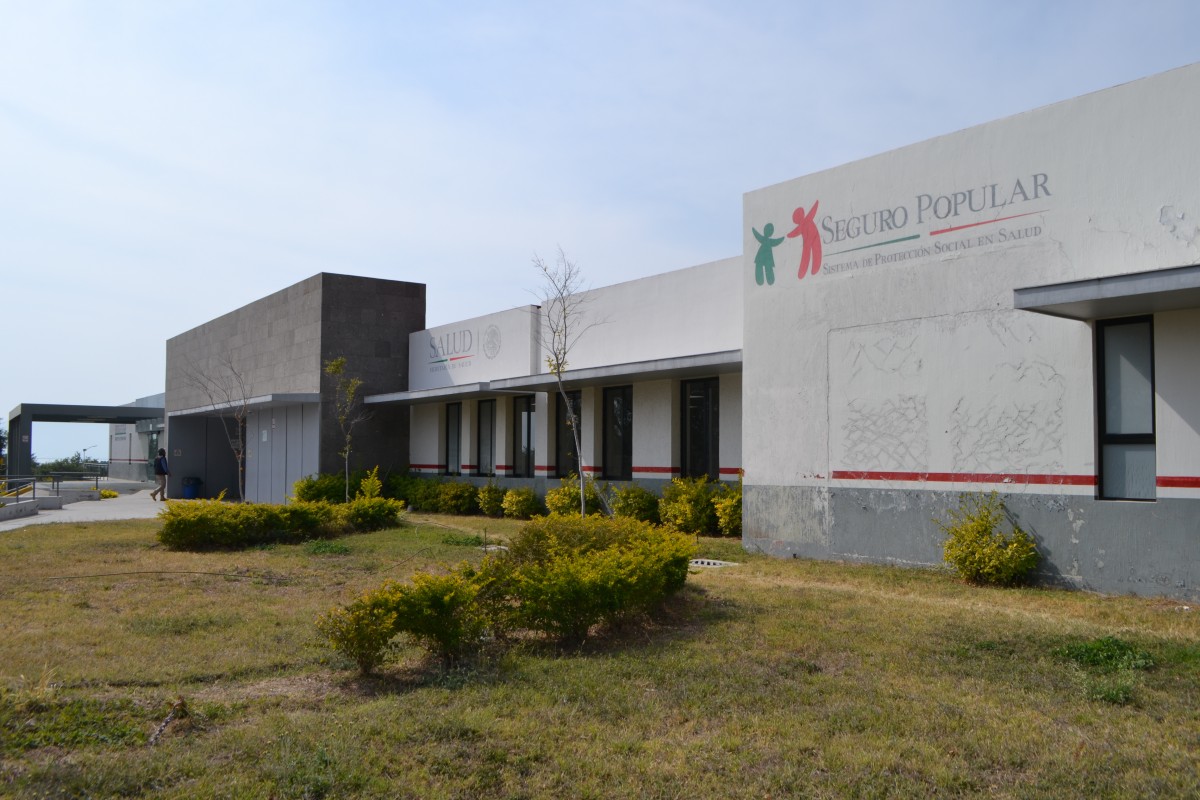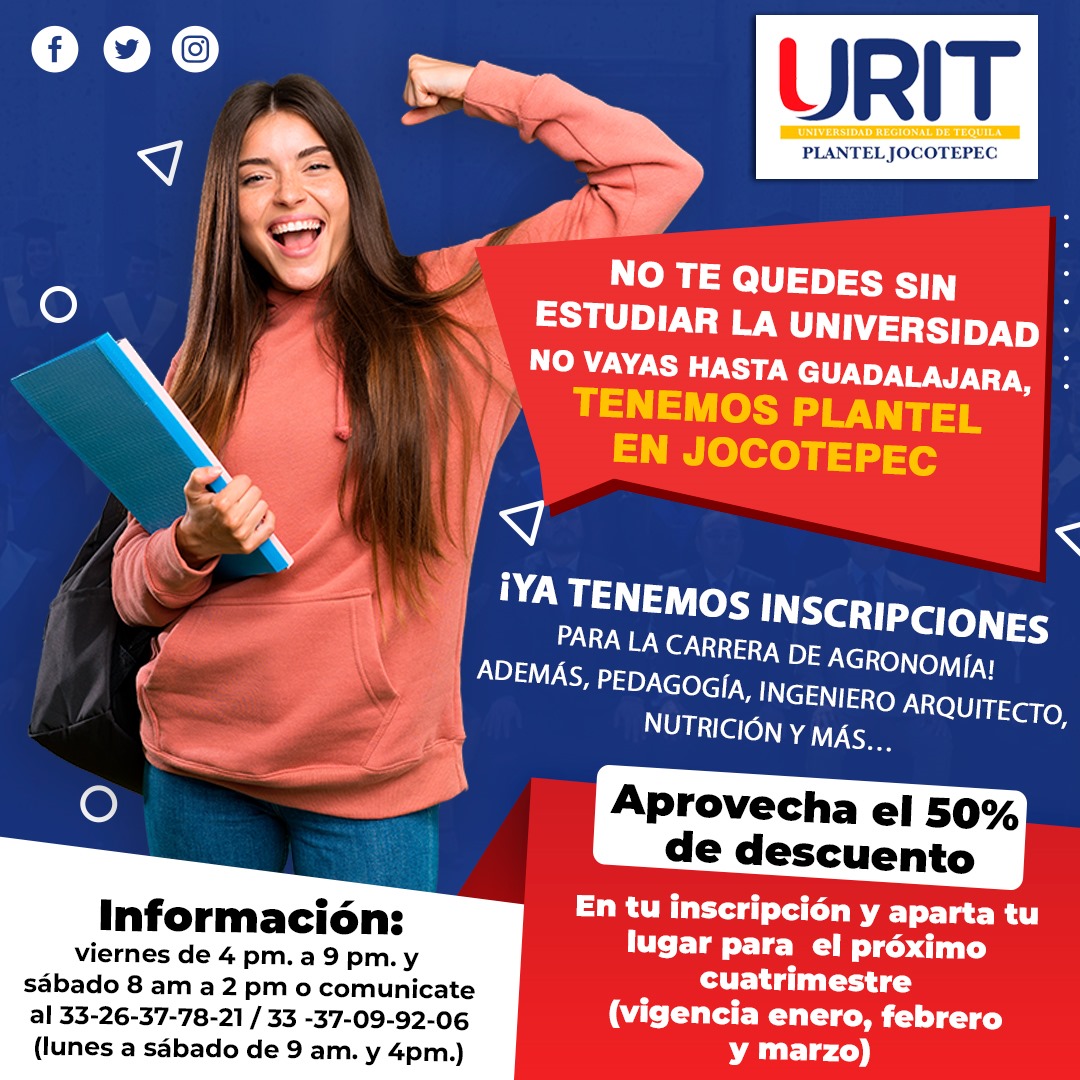inglés
Garbage problem continues to grow in Jocotepec
Garbage from about 15 days ago at the J. Vicente Negrete elementary school. Photo: Courtesy.
Héctor Ruiz Mejía: The inconsistent garbage collection system in the municipality of Jocotepec generates growing sanitary risks for residents, according to a survey conducted by Semanario Laguna.
One person responding to the survey was Mayra Berenice García, director of the J. Vicente Negrete elementary school in El Molino. She said about 15 days worth of garbage has accumulated at the school, generated by the 300 children who attend the institution.
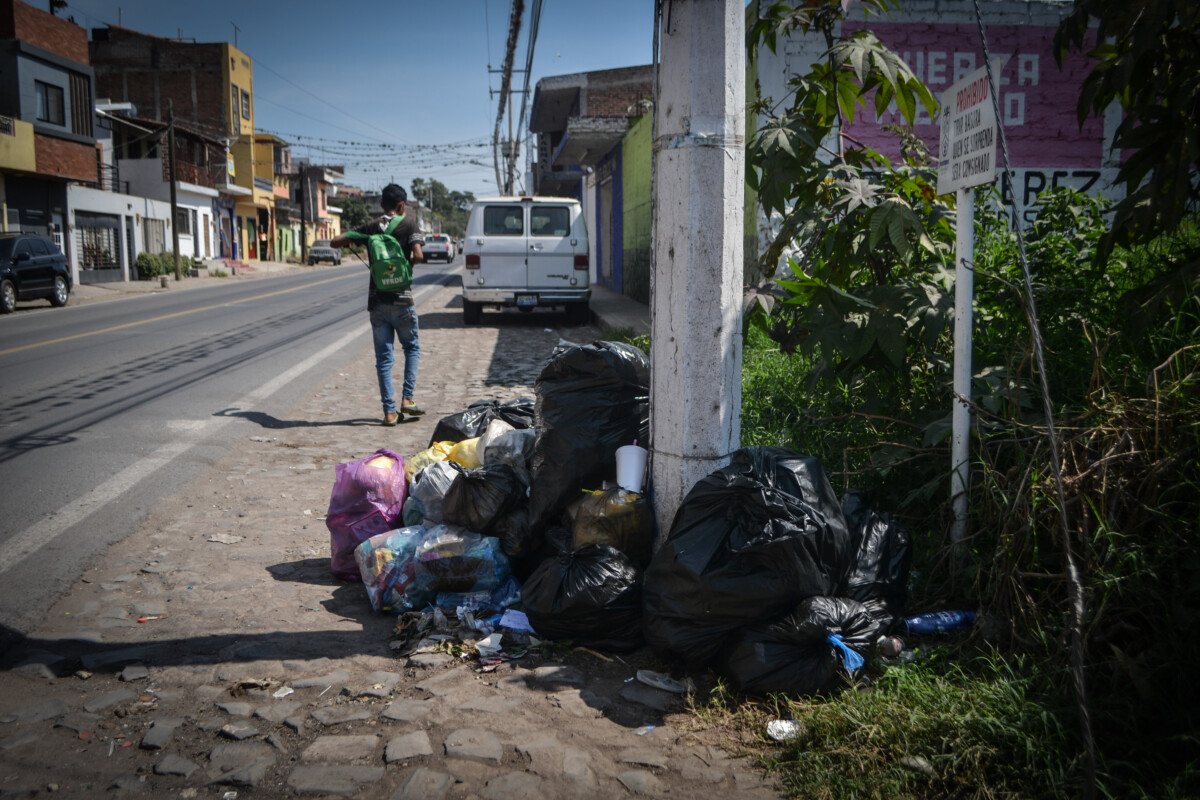
Garbage next to the bus stop in San Juan Cosalá. Photo: Héctor Ruiz.
“It has been an odyssey,” Mayra explained. “They told us that the truck cannot reach where we are. We are up the hill and they tell us the truck doesn’t have enough gasoline, so they ask me to take the garbage down myself.” She said she must carry garbage about 200 meters down the hill.
“Even the director of Aseo Público, Anselmo, has asked me to take the garbage in my truck, which doesn’t cost me anything,” said Mayra, adding that even when they have done so, dogs have destroyed the bags, so they have to gather the garbage again. She prefers to keep it at the school until Aseo Público comes to pick it up.
Gustavo, who runs a grocery store in San Juan Cosalá, has also been affected. Accumulated garbage sometimes gives off unpleasant odors. “It’s worse when there are street markets,” he said. “All the vegetable garbage is left there to spoil.”
A resident named Claudia said rats are a bigger problem than the unpleasant smell. Rats have invaded her house, thanks to the garbage. “I don’t know what to do. I don’t know where they get in. I have covered all the doors with rags,” she said in a distressed way.
While Jocotepec residents try to improvise ways of solving the problem, they fear the crisis will worsen.
In addition, the Ixtlahuacán de los Membrillos government recently refused to allow riverside communities to dump their garbage in the GEN landfill. This has caused dozens of Jocotepenses to store garbage in their homes.
Translated by Mike Rogers
Covid surges in Lakeside. Delta is almost certainly here
Covid19 test.
Patrick O’Heffernan Ajijic JAL. After Lakeside had breathed a sigh of relief when new Covid Cases dropped to 0 on some days, confirmed cases have started to climb and some estimates are that as many as 200 infections have occurred in Jocotepec, Chapala, and Ixlahuacán de los Membrillos in two days, but are not in the confirmed case data because of undercounting and unreported cases.
According to the Chapala Health Talk Facebook Group, quoting government and press sources, there are a total of 8 new confirmed cases in Lakeside comprising 4 in Chapala, 4 in Ixtlahuacán de los Membrillos and 0 in Jocotepec. (Dr. Miguel Ibarra Garavito, SSJ Health Area Coordinator told Laguna of one new case in Jocotepec, bringing the confirmed total to 9 as of July 26.)
This rise in infections strongly indicates the entry of the Delta variant into Lakeside, a real possibility, according to Ibarra Garavito, who said that there are Covid cases in Jocotepec that originated with people who recently travelled to Cancun, Los Cabos, Puerto Vallarta, places that have the variant, but he does not yet have data to document this.
Confirmed cases are those of positive tests of people who reported for health care with symptoms of Covid; estimates are based on models used by the Health Ministry. Models are also used to estimate the number of active virus carriers (AVC), i.e., currently contagious persons. The AVC estimates for Lakeside have more than tripled to 3.4 AVCs per 1000 residents over the last two weeks (2.3 last week and 1.0 the week earlier) according to Chapala Health Talk.
UC Davis Health reports that Delta variant symptoms are similar to those of COVID-19 but physicians are seeing people getting sicker quicker, especially for younger people. Research shows it grows more rapidly in the respiratory tract and can present symptoms similar to the common cold, especially in vaccinated people. People with cold symptoms should get a PCR test within 3 days of the onset of symptoms (keep track of the date).
Free PCR testing is available if you think you have had contact with a person with Covid. Call: 333 823-3220 and follow the instructions given by the staff of the Secretaria de Salud, Jalisco.
Vaccines are now available for 18+in clinics in Lakeside. Follow health ministry sites, Chapala Health Talk, or the Lake Chapala Covid-19 Facebook Group.
This story was compiled from government and news sources and information posted on Chapala Health Talk Facebook Group https://www.facebook.com/groups/ChapalaHealthTalk/which utilizes English and Spanish sources and notes that there may be errors in translation and reporting and rapid changes in reported data..
.
San Juan Cosalá residents protest change in bicycle lane direction
Dozens of Cosalense residents gathered at the school «de abajo» to express their disagreement with the direction of the bike path to municipal authorities.
Berenice Barragan (Jocotepec, Jalisco) – Many residents of San Juan Cosalá protested against the changes in the Chapala-Jocotepec bike path, the 25 kilometer bike path will go through La Paz street in San Juan Cosalá on its way to Jocotepec Dozens of protesters gathered Wednesday, April 21, at the 700 Urban Elementary School, J. Encarnación Rosas, on La Paz Street at the intersection of Del Cardenal Street to voice their concerns.
«We were not informed that the direction of the work would be changed, “ one protester told Laguna, saying that, “as residents, we don’t like the fact that they are coming down the street below. Chapala and Ajijic are very nice with the bicycle path, but San Juan will have nothing to beautify it because of the road».
However, as Director of Public Works of Jocotepec Héctor Hernández, who represented himself as the voice of the state government and municipal authorities listened, local merchants supported the change of the second section of the bike path. The second section of the work began construction last September, comprising Ajijic and San Juan Cosalá, valued by the Secretary of Infrastructure and Public Works (SIOP) at 87.5 million pesos.
«If they continue the work along the highway, they will not leave us space to unload our merchandise, and our sales will drop because people will no longer have a place to park». said the merchants.
Hernández explained that, although the work was a federal project, he would notify the corresponding agencies of the people’s disagreements, which would remove him from responsibility for the work.
«I will make sure that they come and listen to them as I am doing. I will do what the majority of the municipality is in favor of,” he assured the demonstrators.
Translated by Patrick O’Heffernan
Una conversación con Luis F. Pacheco Cámara, nuevo Director Ejecutivo de Lake Chapala Society
El 16 de febrero, el Dr. Patrick O’Heffernan, editor de la Sección Inglesa de Laguna, se sentó para una entrevista exclusiva con Luis F. Pacheco. La entrevista duró más de una hora y cubrió los antecedentes, la experiencia, la filosofía y la visión de Luis Pacheco para LCS. La entrevista duró más de una hora y se publicará en Laguna en tres partes. Ha sido editada ligeramente para mejorar la fluidez y el espacio.
Parte 1: antecedentes para superar las diferencias culturales
Patrick: Háblanos de tu trayectoria.
Luis: Ha sido un viaje interesante. Soy de Ciudad de México y primero estudié ingeniería química, pero lo dejé en el último semestre. Me dediqué al sector social y me hice jesuita durante 8 años. Estuve muy involucrado con las comunidades indígenas. Trabajé en el campo y en una zona aledaña a la Ciudad de México y aprendí que la pobreza urbana puede ser muy diferente y violeta a la del campo. Acabé en Guadalajara y estudié filosofía y ciencias sociales para hacer el doctorado. Surgió Covid y aún no he terminado mi doctorado. He participado en el diseño de programas y en la enseñanza a diferentes niveles. Y tengo experiencia en la recaudación de fondos.
Patrick: Una de tus especialidades es la comprensión intercultural, ¿no es así?
Luis: Pasé tres años en organizaciones relacionadas con la comprensión cultural. Las dos áreas que me gustan son la filosofía social y la ética, y creo que la perspectiva cultural es un punto fuerte y funciona bien en América Latina. Me ayuda a entender las cosas: el enfoque comunitario.
Patrick: Háblame de las diferencias culturales entre gringos y mexicanos. Por ejemplo, el concepto del tiempo y como es visto de manera diferente por las dos comunidades; muchos gringos no se han acostumbrado a esta diferencia en las expectativas sobre el tiempo.
Luis: No y sufren mucho por eso. Uno de los aspectos del trabajo en LCS es cómo podemos crear la transformación cultural que tenemos que pasar si queremos vincular a estas comunidades. Si esperas el estándar de tu propio lado del mundo no vas a entender por qué las otras comunidades hacen las cosas que hacen y te tratan como lo hacen. El tiempo es un ejemplo de ello. Por eso creo que el enfoque intercultural es muy importante. Ambas culturas tienen algo que dar, pero tienen expectativas diferentes, así que debemos crear un equilibrio. Ambas comunidades son muy ricas y pueden enseñarse cosas mutuamente.
Patrick: Habla de eso.
Luis: La cultura americana no tiene una visión histórica de sí misma, pero utilizan el humor, es un recurso cultural muy fuerte para afrontar la vida cotidiana. Los mexicanos tienen una forma especial de crear humor, pero es diferente.
Patrick: ¿Y el consejo a los estadounidenses de traer paciencia a México?
Luis: Paciencia. He pensado en ello. Los americanos son muy organizados y prácticos y sistematizados. Los mexicanos no somos muy buenos en eso, hacemos muchas cosas pero no estamos acostumbrados a que lo que hacemos se traduzca en una metodología que se pueda utilizar en otro lugar. Eso va desde la cocina hasta las tareas domésticas y las profesionales. Si le pides a los cocineros mexicanos que te enseñen cómo lo hacen, te lo explicarán, pero nunca lo harán dos veces de la misma manera. Siempre es bueno, pero diferente. Pero es difícil enseñar sus métodos. Los americanos son buenos para estandarizar las cosas; los americanos son muy buenos en eso.
Patrick: Los mexicanos tienen una gran alegría en su cultura. – su cultura. ¿Cómo afecta eso al acercamiento de las dos culturas?
Luis: Una de las preocupaciones de la junta directiva y la razón por la que están trayendo a un director ejecutivo mexicano por primera vez, es cómo podemos hacer que ambas comunidades se acerquen. Una de las diferencias culturales con las que tenemos que trabajar es el contrato social, que para los estadounidenses se basa en el individuo. En México, se basa en la comunidad. Es muy importante, la comunidad es lo primero. Las fiestas, las celebraciones son tan importantes Nunca eres un individuo, eres parte de un grupo. Esto es especialmente así en las comunidades indígenas, un poco menos en las ciudades cosmopolitas.
Patrick: ¿Cómo funcionan estas dos culturas juntas?
Luis: Hay virtudes en ambas comunidades, muy buenas, pero a veces hay que reflexionar y trabajar sobre ellas. El diálogo entre comunidades lo permite. La flexibilidad es valiosa.
La próxima semana: una nueva visión para LCS
Traducción realizada con la versión gratuita del traductor www.DeepL.com/Translator
Ajijic’s bicycle lane is still filled with cars and obstructions.
Despite remodeling the bicycle lane, the problem of illegal parking in the center of Ajijic remains unsolved.
Sofía Medeles/Domingo M. Flores (Ajijic, Jal.) – Cyclists riding through central Ajijic still must navigate illegally parked cars and other obstructions on the bike path through town. Cyclists and merchants along the path want barriers to stop the illegal parking.

There are no containment barriers to block cars from parking on the bike path from Javier Mina Street to where it ends on Tempisque Street, unlike the barriers along the eight kilometers of the ciclovía that connects Chapala and Ajijic .
To read the full news story, look for our printed edition in stores and supermarkets in Chapala, Ajijic and Jocotepec. Laguna 438.
Jocotepec to come alive again in mid-May
In street markets and markets, it was observed that citizens have «let their guard down».
Miguel Cerna.- One more week. Jalisco Governor Enrique Alfaro Ramírez will announce the process for reopening the economy and restarting activities in the municipality next week between May 15 and 17. In the meantime municipal leaders are asking citizens not to relax sanitary security measures.
It is as a «light of hope» said Municipal President, José Miguel Gómez López, who saw the promised reopening of non-essential businesses and those mainly affected by the coronavirus pandemic as a very positive sign.
«We already have a clear notice, he said, “that between May 15 to 17 the governor will communicate how the reopening of businesses will proceed gradually and the strategies to help them accelerate the recovery”.
However, after the Municipal President’s May 6 announcement many Jocotepec citizens interpreted the message as a relaxation to health measures such as the use of mouth masks that has been mandatory in the state since April 19. A tour by Seminario Laguna through the Municipal Market and the Thursday market revealed a large number of people in public spaces, most of them without masks. President Gómez López asked the emergency units to maintain their efforts and to request people to stay at home and, if they must go out, restrict travels to one person per family who always wears a face mask.
«I just want to tell people to continue resisting the virus, keeping themselves and their families inside until the 15th of May. If we manage to get through the month without a new coronavirus problem, surely this will be very good news”, he added.
As of the May 7 data collection, Jocotepec did not register any positive cases of Covid-19, while 22 suspicion cases were dismissed. The neighboring municipalities of Chapala and Tuxcueca have also not registered any cases, so the reactivation of activities can take place more quickly. However, Health Region IV Director Ramiro Gil Pérez clarified that this does not mean that the problem is about to end, but rather that – gradually – some of the activities that were suspended to prevent the spread of the pandemic may be resumed.
He considered it premature to speak of a 100 percent return to normal activities in either the economy or in public life, so he asked citizens not to let their guard down. He exhorted them to continue implementing protection mechanisms from home, warning that the quarantine could be restarted if people acted irresponsibly.
“We are not afraid that (the economy) will be reactivated, we are afraid that the population will not abide by the necessary precautions that are a priority while we are in Phase 3 of the pandemic. Our fear is that that people and businesses community do not have the capacity for the needed restraints”, Director Gil Pérez said.
Public spaces such as the main square, sports fields and piers will remain closed at least until May 15. The State Government will announce their reopening when data on the presence of Covid-19 indicate that it is safe. (translated by Patrick O’Heffernan)
Vendors fear low sales of the popular pitayas because of Covid-19 measures
From 09:00 hours, there are pitayas and guamúchiles in the gate of the town.
Miguel Cerna.- A loss of up to 50 percent in demand has been projected in Jocotepec for the popular cactus fruit pitayas -sometimes known as “dragon fruit”- and the sweet tree fruit known as guamúchiles, due to the government’s sanitary measures to combat the pandemic. In other years the season for pitayas and guamúchiles is eagerly awaited by both consumers and marketers. But 2020 has been clouded by the government sanitary orders that have severely impacted markets for the seasonal fruit.
Jesús Solano Santana, who is sells these fruits when the weather heats up, described the sales as bad during the first week when he was located at the eastern gate of the main square during the months of May and June.
«I even sell pitayas until the rainy season comes, two and a half months or so. People ask us because they come from the other side -to the Fiestas of Señor del Huaje- but also to see this year how it is going. Because of this, I believe that it will affect us up to 50 percent, «he said.

The current prices range from 10 to 20 pesos per pitaya.
In addition to the lack of buyers, Solano Santana noted a shortage of the fruit, indicating that its price will rise. Currently pitayas -which are from Tepec, Amacueca and San Marcos Evangelista, Zacoalco de Torres- range in price between 10 and 20 pesos per unit, depending on their size and quality. This may rise.
Even more worried is Armando Contreras Sánchez, 65 years old, who specializes in the purchase and sale of these fruits. He was denied permission to sell in Chapala and must now shift his business to Jocotepec.
«In Chapala, people from the City Council told me to go to my municipality to sell -Zacoalco de Torres-. In my municipality it is like bringing fish here -where there is already a supply of fish-; there are guamúchiles, there are pitayas. What are we going to do?”, he asked.
Although sales are just beginning, what should be a season bright with the intense colors of the pitayas is turning gray because of coronavirus. Although demand is low, vendors will remain at the corner of Miguel Arana and Allende streets for the next two months, from 9:00 a.m. until their products are all sold. (translated by Patrick O’Heffernan)
Jocotepec Community Hospital ready for Covid-19 patients
The Community Hospital of Jocotepec has three mechanical ventilators.
Miguel Cerna.- The Community Hospital of Jocotepec has been declared a Level One admitting facility for patients in serious condition due to the coronavirus. Level one hospitals are adequately staffed and equipped but may not have all the facilities that higher level hospitals have. The Community Hospital has the necessary equipment and sufficient supplies for expected cases, according to its Director.
Edgar González Jiménez , Director of the Community Hospital of Jocotepec, said that after a hospital restructuring and multiple trainings for the necessary staff and the installation of appropriate equipment, he considered that the institution is ready to provide care for eventual cases of Covid-19.
«I would say that the hospital is equipped to admit and care for seriously ill patients; that is a fact. We are not a Second or Third level hospital so we can’t say that we will attend to all who arrive, but that our capacity and infrastructure is first-rate for the patients we can admit. However, we do not have an intensive care area,» he explained.
The hospital prepared for Coronavirus patients by dividing its facilities into two areas, one for the care of patients with Covid-19 and the other for non-infectious users (no Covid-19), who are at the hospital for other treatment or to see different specialties. The hospital, part of Health Region IV, has a workforce of 140.
The Community Hospital of Jocotepec will only be able to care for three patients at one time who require full hospitalization, since it only has three mechanical ventilators. The hospital is equipped with two isolation mobile units that can transfer patients to Third-level hospitals when it has reached capacity. For patients throughout Jalisco, including Jocotepec, patients that cannot be treated at a local hospital will be transported to the Fray Antonio Alcalde Hospital (Civil Viejo), in Guadalajara.
Edgar González said that it’s more important for citizens keep up the isolation measures and the sanitary measures such as hand washing and sanitation of households than worry about the care capacity of the hospitals that will attend to serious cases in the area.
Ramiro Pérez Gil, Director of Health Region IV based in La Barca, reported that they have sufficient supplies such as masks and special suits and other security equipment to supply the three hospitals that will attend to serious cases in the 13 municipalities in Region IV. Pérez Gil also explained that the delay in the results of the suspected cases in the region is due to the backlog of samples to be analyzed, which can delay results for up to a week, although the agency’s protocol calls for results in 24 to 48 hours. (translated by Patrick O’Heffernan)
The use of mouth covers is mandatory in Chapala
Seniors and those considered vulnerable should stay home.
Manuel Jacobo (Chapala, Jal) .- On April 19, Jalisco Governor Enrique Alfaro Ramírez decreed the mandatory use of face masks and staying home except for essential activities. The Municipality of Chapala is enforcing this decree with local laws that require all people in Chapala to wear masks in public, including those working at essential jobs and those passing through the municipality.
To ensure that all passers-by in Chapala do not have a pretext for not using face masks, the City Council will provide three thousand face masks during the first week that will be given away at various points in the municipality. This the situation will be assessed next week to determine if it these are enough to comply with the decree of the Government of the State of Jalisco or if more will be required. In addition, police patrols will broadcast warnings and will continue surveillance throughout the municipality so that the measure is complied with by the inhabitants.
The measure dictated by the Governor and the provisions set forth in the General Health Law, empowers the City of Chapala as a health authority to participate in epidemiological surveillance and use the municipal police to be able to comply with the provisions.
The Municipal Trustee of Chapala, Isaac Alberto Trejo Gracián, indicated that current police training for Covid-19 teaches that warning the population will be a priority issue, and that officers should not hesitate to apply the law to citizens who are reluctant to comply. Police response can include a 36-hour arrest or a fine ranging from 860 pesos to 86 thousand pesos, depending on the case.
For his part, the Municipal President, Moisés Alejandro Anaya Aguilar, reaffirmed that there will be sanctions for those who do not wear face masks, saying that “anyone who has to go out to the street to carry out an essential activity, use public transport or go to buy medicine or any other activity must use the mouth mask ”reaffirmed the mayor.
Likewise, Trejo Gracián indicated that the compliance by the population of has improved markedly, falling from 19 arrests of citizens who disregarded sanitary measures to three arrests. Additionally, nonessential business warnings have decreased, although some people complained about not be able to make noise at night. However, public officials say that in general, the inhabitants of Chapala are largely complying with the provisions and hope that they will continue to improve.
Jocotepec expands its capacity to treat Covid-19 patients.
The ventilators had a joint cost of $324,800 pesos.
Miguel Cerna.- The Government of Jocotepec increased its capacity to care for severe coronavirus patients with the acquisition of two mechanical ventilators. Ventilators are essential for the care of delicate patients, so the municipality opted to acquire two: one that will be used exclusively for the transfer of patients who are intubated and the other for internal hospitalization in the Municipal Medical Unit.
«In a contingency of a serious patient, it is difficult for our doctors or paramedics to give ventilatory assistance for hours, so the additional machine is going to facilitate the transfer of a seriously infected patient who is hospitalized here,” explained the head of the area, Rafael Gómez Rodríguez.
The two artificial respirators, which cost $324 800 pesos in addition to eight additional hospital beds installed at the Municipal Clinic, will be added to the three that are available in the Jocotepec Community Hospital (HCJ), so the municipality has a total of five. Also, on April 14, the HCJ transferred one of the 4 mobile isolation units to the Municipal Medical Unit for the transfer of patients suspected or confirmed of coronavirus. The units were donated by a private company.
For his part, the municipal president, José Miguel Gómez López , said that because it is necessary to have mechanical ventilators on hand to attend to respiratory problems or accidents, the Covid-19 pandemic required the municipality to acquire additional units.
“We made the acquisition, even though we had budget cuts and there are no resources and Municipal funds are not being raised. Despite this we managed to make the purchase with $324,800 pesos for the two ventilators , so that we will be able to treat additional patients or move them safely to other hospitals, «he said. He also congratulated the nine doctors, six nurses, ten paramedics and other health and emergency personnel, who are «facing» this situation.
Until the April 29 reporting cutoff, Jocotepec recorded zero positive cases, 22 negative cases, zero suspects and no deaths of people with Covid-19, according to federation figures. (translated by Patrick O’Heffernan)
© 2016. Todos los derechos reservados. Semanario de la Ribera de Chapala



